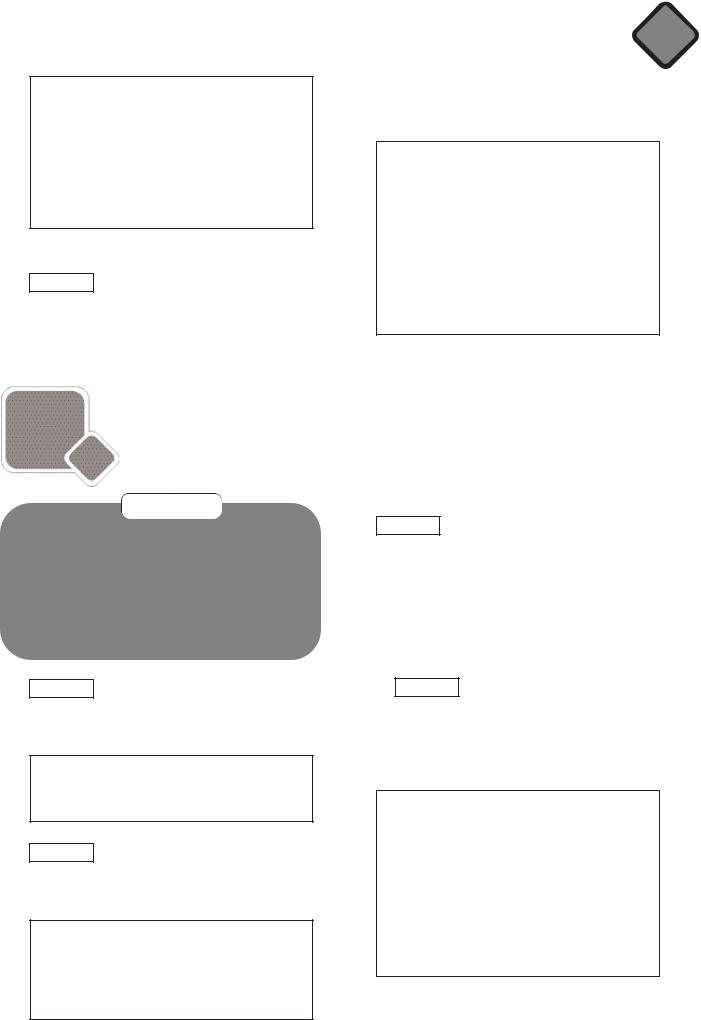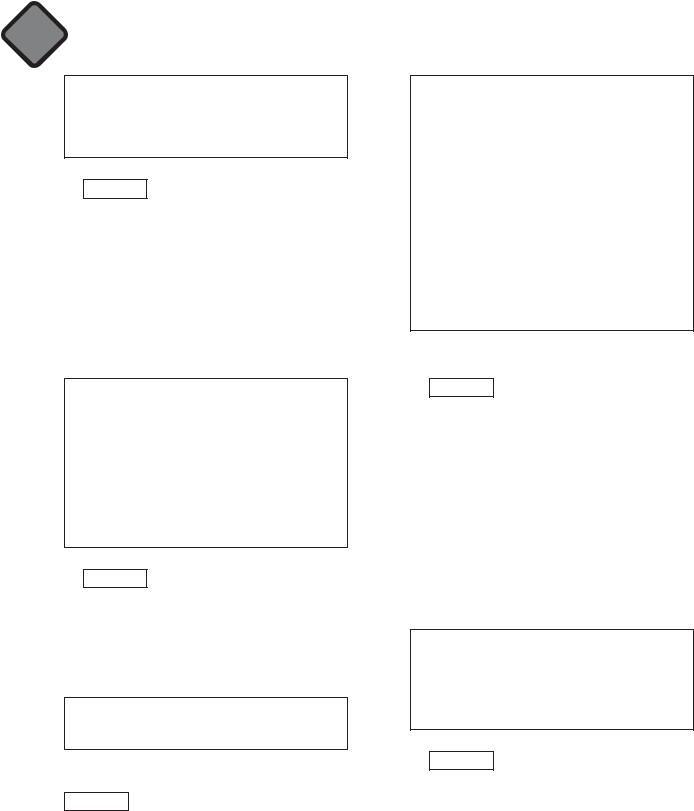
Учебники школьные / анг яз уч ответы
.PDF
B:Well, there’s a fireworks display, a paella cooking contest, lots of singing and dancing and a huge food fight, ‘La Tomatina’.
A:It sounds like fun. How many people actually take part in the food fight?
B:There are around 30,000 people who throw about 100,000 kg of tomatoes at each other. etc
Writing
9Focus Writing a short paragraph about a
festival
ñRead the rubric with Ss.
ñAllow Ss time to write their paragraphs. Alternatively, assign the task as HW.
Reading & Vocabulary 1a
ñInvite Ss to read their paragraphs in (without saying the name) and have guess the festival.
Suggested Answer Key
The International Snow, Ice and
Fire Festival
This festival takes place in Perra,
every year. It is held in February and it lasts for a week. There are sculpting contests in ice and snow and people come from all over the world to take part. There is also a varied programme of entertainment for the spectators.
1 b Listening & Speaking
Objectives
Vocabulary: related to superstitions Reading: reading for specific information
Listening: listening for gist; listening for intonation; listening for confirmation
Speaking: role playing; expressing concern and reassuring; practising intonation; talking about superstitions in your country
1Focus Matching a picture to a text
Read the rhyme aloud and elicit which picture it matches.
Answer Key
The rhyme matches the picture of the shooting star.
2Focus Introducing the topic
Read the dictionary entry with Ss and elicit how it is related to the rhyme and the pictures.
Suggested Answer Key
The dictionary entry is related to the rhyme and pictures because the pictures are examples of the word ‘superstition’ and the rhyme describes a particular superstition.
3Focus Discussing the topic of the unit
ñRead through the list of superstitions and check Ss’ understanding of each.
ñElicit superstitions that are similar in Ss’ country and discuss.
(Ss’ own answers)
Listening
4 a) Focus Understanding attitude and
opinion
ñRead through the statements with Ss.
ñElicit from different Ss which ones they agree with and why.
Suggested Answer Key
I agree most with statements A and C. I think it is better to be safe than sorry because it’s better for someone to be careful rather than do something risky they may regret later on.
I also agree that you make your own luck because our lives are usually what we make of them. If you work hard and have a positive attitude in life, then it is more likely that good things will happen to you.
13

1b |
|
|
Listening & Speaking |
|
|
|
|
|
Listening for comprehension (gist) |
|
|
|
||
b) |
|
Focus |
||
|
|
|
(multiple |
matching) |
|
|
ñ Explain the task to Ss and have them reread |
||
|
|
|
the statements from Ex. 4 a. Direct Ss to try |
|
|
|
|
to understand the general idea (gist) of |
|
|
|
|
what the speaker is saying. |
|
|
|
ñ Play the recording. |
||
|
|
ñ Ss complete the task individually. |
||
|
|
ñ Play the recording again to check Ss’ |
||
answers.
Answer Key |
|
Speaker 1 ― C |
Speaker 4 ― E |
Speaker 2 ― A |
Speaker 5 ― B |
Speaker 3 ― D |
|
|
|
Everyday English
5Focus Expressing concern and reassuring
ñRead through the language box with Ss.
ñIn pairs have Ss role play the different situations. Direct them to use the expressions from the language box.
ñMonitor the activity around the class and ask some pairs to act out their exchanges in front of the class.
Suggested Answer Key
2A: What’s the matter?
B:I’m taking the boat out tonight and I’m a bit anxious because there’s going to be a full moon.
A:I’m sure that if you take care then there will be nothing to worry about.
3A: Are you alright?
B:I’m really worried as I’ve broken a mirror. Perhaps I’ll have seven years’ bad luck!
A:Don’t worry. Everything will be fine if you think rationally. It’s only a superstition.
4A: Is there anything troubling you?
B:Yes. I walked under a ladder and I’m worried that now something bad will happen to me.
A: There’s nothing to worry about. You should pay less attention to old wives’ tales.
6Focus Identifying language functions/
Predicting the context of a dialogue
ñHave Ss read out the sentences 1 to 4.
ñElicit from Ss which express what. Refer Ss to the table on p. 12 if necessary.
ñElicit from Ss what the dialogue is about based on the sentences.
Answer Key
Sentence 1 expresses worry.
Sentence 2 expresses concern.
Sentence 3 reassures.
Sentence 4 expresses worry.
The dialogue is about two friends talking about superstitions.
7 a) Focus Reading for specific information
(comprehension questions)
ñDirect Ss to the incomplete sentences and read them with Ss.
ñHave Ss read the dialogue individually and complete the sentences.
ñCheck Ss’ answers.
Answer Key
1 she has killed a spider
2 kill a spider
3 in superstitions
4 Mrs Smith, her English teacher
5a school (writing) competition
b)Focus Identifying specific information
in a text
ñHave Ss scan the dialogue for superstitions and list them.
ñElicit which superstitions from the dialogue bring good or bad luck.
Answer Key
killing a spider ― bad luck keeping a lucky charm ― good luck walking under ladders ― bad luck
c)Focus Role playing a dialogue
ñIn pairs have Ss take roles and read out the dialogue and decide on a title for it.
14

ñInvite a few pairs to read out the dialogue and their title in front of the class.
Suggested Answer Key
Along Came A Spider
Intonation
8 a) Focus Identifying stressed syllables
ñExplain to Ss that intonation is the way your voice rises and falls as you speak and the emphasis you put on words or parts of words.
ñPlay the recording. Ss listen and complete the task individually.
ñPlay the recording again with pauses to check Ss’ answers.
ñInvite Ss to translate the expressions into their L1.
Answer Key
1 That’s a load of rubbish!
2 What a coincidence!
3 That’s not the point!
4 You lucky thing!
5 Lucky for us!
(Ss’ own answers)
b) Focus Practising intonation in
exclamations
ñIn pairs have one S say a sentence and the other S react with a sentence from Ex. 8a using the correct intonation. Direct Ss to then exchange roles.
ñMonitor the activity and check for correct intonation.
Suggested Answer Key
1 Lucky for us!
2 That’s not the point!
3 You lucky thing!
4 That’s a load of rubbish!
5 What a coincidence!
Listening & Speaking 1b
Answer Key
1 b 2 a 3 a
10Focus Discussing superstitions
ñIn pairs have Ss discuss superstitions in their family.
ñMonitor the activity and assist as necessary.
Suggested Answer Key
A:In my family it is bad luck to spill salt.
B:In my family, we never whistle in the house so that we don’t lose all our money.
A:Yes, it’s the same in my family. We also consider it bad luck to see a black cat while it’s crossing the street. etc
Speaking
11 Focus Talking about superstitions in your
country
ñIn pairs Ss discuss different superstitions in their country.
ñInvite Ss to tell class about these superstitions and ask the class for feedback.
Suggested Answer Key
A:I can think of lots of popular superstitions. To start with, it is considered a bad omen to see a woman with an empty bucket walking toward you.
B:Yes and there’s the one that says that an unmarried girl should not sit at the corner of a table, or else she will not get married
for seven years.
A:You’re right. It is also bad luck to give anything sharp such as scissors or a knife to someone as a present.
B:True. It is said to be good luck to trip over your left foot or to leave a place while it’s raining. etc
Say it right
9Focus Understanding social exchanges/
Listening for confirmation
ñ Have Ss complete the task individually.
ñ Ss then listen to the recording and check their
answers.
15

1 c Grammar in Use
Objectives
Grammar: present simple; present continuous; present perfect; present perfect continuous; adverbs of frequency
Reading: reading for lexico-grammatical correctness Speaking: role playing; exclamations; exchanging news
7I’m having ― present continuous ― a fixed arrangement in the near future
8I’m going back ― present continuous ― a fixed arrangement in the near future
(Ss’ own answers)
2 Focus Practising present tenses
1 a) Focus Identifying the present perfect
continuous
ñHave Ss read the text and identify the verb(s) in the present perfect continuous.
ñElicit the present perfect continuous structure and write it on the board: have + been + main verb + ing.
Answer Key
present perfect continuous: I’ve been dancing
b) Focus Understanding the uses of
present tenses
ñReview with Ss the different present tenses and their uses in the Grammar Reference Section.
ñHave Ss complete the matching task individually and compare their answers with a partner.
ñCheck Ss’ answers and have Ss identify these tenses in their L1.
Answer Key
1 I’ve been ― present perfect ― an action which started in the past and continues to the present
2I am having ― present continuous ― a temporary situation
3I love ― present simple (stative verb) ― an expression of feeling
4 I’ve been dancing ― present perfect continuous ― an action which started in the past and continues to the present with emphasis on duration
5I’ve taken ― present perfect ― an action completed recently
6I’m lying ― present continuous ― an action happening now
16
ñHave Ss complete the task individually. Direct Ss to pay attention to time expressions such as every morning, at the moment, already, since, etc, to help them.
ñInvite a few pairs to read out the exchanges and give reasons for their answers.
Answer Key
1A: does the parade start? (present simple ― for timetables and programmes)
B:starts (present simple ― for timetables and programmes)
are meeting (present continuous ― for fixed arrangements in the near future)
2A: looks (stative verb in present simple meaning ‘appears’)
Is he having (stative verb in present continuous meaning ‘is he experiencing’)
B:’s thinking (stative verb in present continuous meaning ‘is considering’)
3A: Have you ever attended (present perfect ― for actions that happened in the past at an unstated time.)
B:am going (present continuous ― for fixed arrangements in the near future)
4A: have you been doing (present perfect continuous ― for an action which started some time in the past and has a visible result in the present)
B:have been digging (present perfect continuous ― for an action which started in the past and continuous up to the present, with emphasis on the duration)
5A: are you smelling (stative verb in present continuous meaning ‘are you sniffing)
B:smells (stative verb in present simple meaning ‘it has a smell’)
reminds ( stative verb in present simple meaning ‘makes me remember’)

3Focus Understanding differences in meaning
in present simple and present continuous tenses
ñRefer Ss to the Grammar Reference Section to review the theory on stative verbs to help them complete this task.
ñRead through the exercise and elicit the differences in meaning for each verb in the present simple and present continuous.
Answer Key
1a) looks (= appears)
b)is looking (= is directing her eyes)
2a) tastes (= has a delicious flavour)
b)is tasting (= is testing the flavour of)
3a) feels (= has the texture of)
b)is feeling (= is experiencing)
4a) thinks (= has the opinion of)
b)is thinking (= is considering)
5a) has (= owns/possess sth)
b)is having (= is holding)
4Focus Practising adverbs of frequency
ñElicit when we use adverbs of frequency (to tell how often we do sth).
ñHave Ss complete the questions individually and then ask and answer questions in pairs.
ñMonitor the activity and check for correct usage of adverbs.
Answer Key |
|
|
|
1 |
do you have |
6 |
do you go |
2 |
do you go |
7 |
do you have |
3 |
do you go |
8 |
do you have |
4 |
do you do |
9 |
do you do |
5 |
do you go |
10 |
do you go |
|
|
|
|
Suggested Answer Key
A:How often do you go out with friends?
B:I usually go out with my friends at the weekend.
A:How often do you go shopping?
B:I seldom go shopping only when I need something.
A:How often do you do the washing-up?
B:I always do the washing-up, every night after dinner.
Grammar in Use 1c
A:How often do you go out for a meal?
B:I sometimes go out for a meal to celebrate a special occasion. etc
5 a) Focus Asking/Answer questions using the present perfect
ñRead through the example and check Ss understand the task.
ñIn pairs have Ss ask questions using the present perfect (have you ever) with the phrases.
ñMonitor the activity and assist as necessary.
Suggested Answer Key
A:Have you ever slept outdoors?
B:Yes, I have because this summer I went camping. Have you ever been to a fancy dress party?
A: Yes, I have. It was last month.
A:Have you ever stayed up all night?
B:No, I haven’t, but I’ve stayed up quite late. Have you ever played a musical instrument in public?
A:Yes, I have. I’ve played the trumpet in a school play.
A:Have you ever taken part in a parade?
B:Yes, I have as we have one every year in my town. Have you ever danced in the street?
A:No, I haven’t because I don’t know how to dance.
b)Focus Presenting information using the
present perfect
ñInvite Ss to tell the class about their partner based on their answers to the questions in Ex. 5a. Direct Ss to use the present perfect and adverbs of frequency if possible when talking about their partner.
ñCheck for correct use of present perfect and adverbs of frequency.
(Ss’ own answers)
6Focus Practising the present perfect/
present perfect continuous
ñRead through the example and check Ss understand the task.
ñHave Ss complete the task individually and compare answers with a partner.
17

1c Grammar in Use
Invite Ss to read their sentences aloud.
Answer Key
2 I’ve been listening to loud music all afternoon.
3 She’s been lying in the sun all day.
4 He’s lost his key.
5 She’s just broken a mirror.
6 He’s seen the film before.
7Focus Consolidating the uses of the present
perfect/present perfect continuous
Have Ss complete the task individually and check Ss’ answers in class.
Answer Key
1 haven’t been, since
2 has been raining, for
3 has known, for
4 have been, since
5 haven’t seen, for
6 has been reading, since
8Focus Role playing, using the present perfect/
present perfect continuous
ñRead through example dialogue and check for understanding.
ñDirect Ss to pay attention to when we use the present perfect and present perfect continuous.
ñMonitor activity and assist as necessary.
Answer Key
2A: You look really exhausted! What have you been doing?
B:I’ve been doing my homework.
A:What have you done so far?
B:Well, I’ve already finished the maths and I’ve written an essay, but I haven’t studied for my test yet.
3A: You look really dirty! What have you been doing?
B:I’ve been working in the garden.
A:What have you done so far?
B:Well, I’ve already planted some new flowers and I’ve dug up the weeds, but I haven’t cut the grass yet.
9Focus Consolidating present verb tenses/
Reading for lexico-grammatical correctness
ñDirect Ss to pay attention to time expressions and the meaning of the verb in brackets in the text when choosing which present tense to put the verb into.
ñSs complete the text individually and reread the text once completed to check.
ñSs compare answers with a partner.
Answer Key |
|
|
|
1 |
’ve been |
7 |
dance |
2 |
is |
8 |
’ve been looking |
3 |
Have you ever |
|
forward to |
|
heard |
9 |
’ve found |
4 |
have |
10 |
starts |
5 |
have just finished |
11 |
is picking me up |
6 |
dresses up |
12 |
’m feeling |
|
|
|
|
10Focus Understanding exclamations
ñElicit/Explain that exclamations are emphatic sentences (sentences that emphasise a point). Read through the exclamations and elicit which words are used to form the exclamation and create the emphasis (What, How, Isn’t it).
ñElicit what exclamations are there in Ss’ L1.
Answer Key
1 What |
2 What |
3 How 4 Isn’t it |
(Ss’ own answers)
11Focus Forming exclamations
ñHave Ss write exclamations for the statements.
ñCheck Ss’ answers.
Suggested Answer Key
1 What a beautiful new outfit!
2 What a delicious cake!
3 Isn’t she a very pretty girl!
4 How beautifully he sings!
18

Speaking
12Focus Role playing exchanging school news
ñRead through the rubric and the list of time expressions and check Ss understand the task.
ñIn pairs Ss role play exchanging school news, using present tenses and adverbs from list.
ñMonitor the activity and check for correct use of present tenses.
ñInvite pairs to role play for the class and ask for feedback from class.
Grammar in Use 1c
Suggested Answer Key
A:We are building a gym at the moment.
B:Oh, that’s great! We’ve had a a gym since 1986 but it’s quite old so we’re renovating it now.
A:Fantastic! We’ve also been preparing for the prom all week.
B:That sounds fun. We’ve already had our school dance.
A:Great. We’re having a band concert next week.
B:We’ve been having band concerts for many years, so this year we’ve decided to have an orchestra performance. etc
|
1 d |
Vocabulary & Speaking |
|
|
|||||
|
|
|
|
|
|
|
|
|
|
|
|
|
Objectives |
|
|
|
|
|
|
Vocabulary: related to celebrations; special |
|
In picture |
B a woman is |
decorating a |
|
||||
|
Christmas |
tree. There are |
some Christmas |
|
|||||
occasions; idioms with ‘cake’ |
|
|
|||||||
|
cards over the fireplace. |
|
|
||||||
Grammar: relative clauses |
|
|
|
||||||
|
|
|
|
|
|
||||
Reading: reading to identify missing lexis |
|
In picture C some young girls are dressed up in |
|
||||||
Listening: listening for gist |
|
costumes and talking part in a street parade. |
|
||||||
Speaking: describing a celebration |
|
There are lots of people watching the parade. |
|
||||||
|
|
|
|
|
|
|
|||
|
|
|
|
2 |
|
Understanding adjectives |
|||
|
|
|
|
||||||
1 |
Focus |
Describing pictures/Understanding |
Focus |
||||||
|
|
|
|
|
|
|
|
|
|
|
new vocabulary |
|
ñ Read through the list of adjectives and elicit |
||||||
|
|
|
|
||||||
ñ Read through the phrases and check Ss understand |
|
their meanings. |
|
|
|||||
|
the vocabulary. |
ñ Ask various Ss to describe how the people in the |
|||||||
ñ Refer Ss to the pictures and invite Ss to describe |
|
pictures may feel and how they have felt on |
|||||||
|
them to the class using the vocabulary given. |
|
these special occasions. |
|
|
||||
Answer Key
1 B |
2 C |
3 A |
Suggested Answer Key
In picture A a young girl is celebrating her 16th birthday. She is about to blow out the candles on her special birthday cake. In front of her are some gifts that she has received.
Suggested Answer Key
picture 1 ― impatient (to open her presents) picture 2 ― enthusiastic (because Christmas has arrived)
picture 3 ― excited (because people are watching them)
I felt very surprised on my birthday because I didn’t know about my party.
I am very excited at Christmas because it is a very special time.
19

1d Vocabulary & Speaking
I am thrilled to go to a carnival as it is so much fun.
I felt nervous at the last carnival because I was in the street parade. etc
3 a) Focus Listening for gist/Identifying
feelings
ñRead the rubric and check Ss understand the task.
ñPlay the recording and have Ss complete the task individually.
ñCheck Ss’ answers. Play the recording again if necessary. Elicit which words helped them to decide on their answers.
ñAsk Ss to describe how each person feels.
Answer Key
Speaker 1 ― C (cake, sixteen candles, gifts and cards)
happy, embarrassed
Speaker 2 ― A (happy couple, bride’s dress) thrilled
Speaker 3 ― B (parents proud, remember, class)
proud
b)Focus Understanding expressions/wishes
ñRead through the expressions/wishes.
ñElicit which expressions match the events in Ex. 3a and what they mean.
ñAsk Ss to say similar expressions in their own language.
Answer Key
1 C |
3 A, B |
5 A, B, C |
(Ss’ own answers)
4Focus Understanding idioms
ñElicit/Explain that an idiom means something different from the actual meaning of the words that form it.
ñExplain that Ss may have to change the word order in some sentences. Ss complete the task. Ss check their answers in Appendix 3. Ask Ss to find similar idioms in their L1.
ñRead through the answers in class and discuss.
Answer Key
1 Her new CD is selling like hot cakes.
2His birthday was fantastic. He got lots of cards and presents but the icing on the cake was the surprise birthday party.
3You can organise the party. It will be a piece of cake for you.
4John invited himself to the party and then bought lots of friends along. He really takes the cake.
5Sarah wants to go away for her birthday but she also wants to have a big party with all her friends. It sounds to me like she wants to have her cake and eat it.
(Ss’ own answers)
5 a) Focus Reading to identify missing lexis
(multiple choice cloze)
ñElicit an answer to the question in the rubric.
ñRemind Ss how to complete a gap filling task by explaining they should first read text with the gaps to get the gist.
ñDirect Ss to read the text again paying careful attention to the words before and after each gap then choose the best answer.
ñSs should then reread the text to ensure it makes sense.
ñCheck Ss’ answers.
Answer Key
A ‘Sweet Sixteen’ is a type of birthday party.
1 |
B |
3 |
D |
5 |
A |
7 C |
2 |
C |
4 |
A |
6 |
B |
|
b)Focus Describing a celebration
ñRead through the rubric and check Ss understand the task.
ñDirect Ss to use vocabulary they have learnt in the unit.
ñHave various Ss describe a celebration to the class and ask for feedback from the class.
20

|
|
|
|
|
|
|
|
|
|
|
|
|
|
|
|
|
|
|
Vocabulary & Speaking |
|
1d |
|||||||||||
|
|
|
|
|
|
|
|
|
|
|
|
|
|
|
|
|
|
|
|
|
ñ For |
|
|
|
|
|
||||||
|
|
|
|
|
|
|
|
|
|
|
|
|
|
|
|
|
|
|
|
|
additional |
explanation |
of relative |
|||||||||
Suggested Answer Key |
|
|
|
|
|
|
|
|
|
|
|
|||||||||||||||||||||
|
|
|
|
|
|
|
|
|
|
|
clauses |
refer |
|
Ss |
to |
the |
Grammar |
|||||||||||||||
A celebration I enjoyed a lot was my parents’ |
|
|
|
|
||||||||||||||||||||||||||||
|
|
|
Reference Section. |
|
|
|
|
|
|
|||||||||||||||||||||||
25th |
|
wedding |
anniversary. My |
sister and |
I |
|
|
|
|
|
|
|
|
|
||||||||||||||||||
|
|
|
|
ñ Have Ss complete task individually and |
||||||||||||||||||||||||||||
wanted |
to do |
|
|
something |
really special |
for |
|
|
|
|||||||||||||||||||||||
|
|
|
|
|
check Ss’ answers. |
|
|
|
|
|
|
|||||||||||||||||||||
their silver anniversary, so we threw them a |
|
|
|
|
|
|
|
|
|
|||||||||||||||||||||||
|
|
|
ñ As an extension, invite Ss to write their |
|||||||||||||||||||||||||||||
surprise party. We sent out the invitations a |
|
|
|
|||||||||||||||||||||||||||||
|
|
|
own sentences with relative clauses on |
|||||||||||||||||||||||||||||
month in advance and booked their favourite |
|
|
|
|||||||||||||||||||||||||||||
|
|
|
the board and have the class identify if |
|||||||||||||||||||||||||||||
restaurant for the celebration. |
|
|
|
|
|
|
|
|
||||||||||||||||||||||||
|
|
|
|
|
|
|
|
they are defining or non-defining. |
|
|
||||||||||||||||||||||
When the big day arrived, we told them that |
|
|
|
|
|
|||||||||||||||||||||||||||
|
|
|
|
|
|
|
|
|
|
|
|
|
|
|
||||||||||||||||||
we |
felt |
like |
|
|
going |
out |
for |
dinner |
|
and |
|
|
|
|
|
|
|
|
|
|
|
|
|
|
|
|||||||
|
|
|
Answer Key |
|
|
|
|
|
|
|
|
|
|
|||||||||||||||||||
fortunately they agreed. When Mum and Dad |
|
|
|
|
|
|
|
|
|
|
|
|
||||||||||||||||||||
|
|
Defining |
|
|
|
|
|
|
|
|
|
|
||||||||||||||||||||
walked |
|
into |
|
|
the |
|
restaurant, |
everyone |
|
|
|
|
|
|
|
|
|
|
|
|
||||||||||||
|
|
|
|
|
|
1 |
which |
2 |
who |
3 |
which |
|
|
|
|
|
||||||||||||||||
screamed “Surprise”! The look on their faces |
|
|
|
|
|
|
|
|||||||||||||||||||||||||
|
|
|
|
|
|
|
|
|
|
|
|
|
|
|
||||||||||||||||||
was amazing. They were speechless! All their |
|
|
Non-defining |
|
|
|
|
|
|
|
|
|
||||||||||||||||||||
friends and family had gathered together to |
|
|
|
|
|
|
|
|
|
|
|
|||||||||||||||||||||
|
|
1 |
whose |
2 when |
3 |
where |
4 |
who |
|
|
||||||||||||||||||||||
celebrate the joyful event. The party was a |
|
|
|
|
||||||||||||||||||||||||||||
|
|
|
|
|
|
|
|
|
|
|
|
|
|
|
||||||||||||||||||
huge |
|
success. We |
danced all night |
and |
took |
|
|
In the defining sentences, who can be omitted |
|
|||||||||||||||||||||||
lots |
of |
photos |
|
for their |
anniversary album. |
|
|
|
||||||||||||||||||||||||
|
|
|
in sentence 2 and which can be omitted in |
|
||||||||||||||||||||||||||||
Mum |
|
and |
Dad |
|
even |
got |
to |
see |
out-of-town |
|
|
|
||||||||||||||||||||
|
|
|
|
sentence 3. |
|
|
|
|
|
|
|
|
|
|
||||||||||||||||||
relatives they hadn’t seen in years. We had a |
|
|
|
|
|
|
|
|
|
|
|
|
||||||||||||||||||||
|
|
|
|
|
|
|
|
|
|
|
|
|
|
|
||||||||||||||||||
great time and our parents had an |
|
|
|
|
|
|
|
|
|
|
|
|
|
|
|
|||||||||||||||||
|
|
|
|
|
|
|
|
|
|
|
|
|
|
|||||||||||||||||||
unforgettable night. |
|
|
|
|
|
|
|
|
|
|
|
|
|
|
|
|
|
|
|
|
|
|
|
|
||||||||
|
|
|
|
|
|
|
|
|
|
b) |
Focus |
Identifying non-defining relative |
||||||||||||||||||||
|
|
|
|
|
|
|
|
|
|
|
|
|
|
|
|
|
|
|
||||||||||||||
|
|
|
|
|
|
|
Understanding relative clauses |
|
|
clauses |
|
|
|
|
|
|
|
|
|
|
||||||||||||
|
|
|
|
|
|
|||||||||||||||||||||||||||
6 a) |
|
Focus |
|
|
ñ Have Ss read through the sentences from |
|||||||||||||||||||||||||||
|
ñ Write |
on |
the |
board: That’s |
the |
place |
|
|
Ex. 6a |
and |
identify which |
clauses can |
be |
|||||||||||||||||||
|
|
|
omitted |
without |
changing |
the |
meaning |
of |
||||||||||||||||||||||||
|
|
|
which |
burnt |
|
down |
and explain |
|
that |
|
|
|||||||||||||||||||||
|
|
|
|
|
|
|
the sentences (ie. the non-defining ones). |
|||||||||||||||||||||||||
|
|
|
‘which’ |
|
is |
a |
relative |
pronoun |
|
that |
|
|
||||||||||||||||||||
|
|
|
|
|
|
|
ñ Elicit answers in class and check. |
|
|
|||||||||||||||||||||||
|
|
|
introduces the clause ‘burnt down’ |
|
|
|
|
|||||||||||||||||||||||||
|
|
|
|
|
|
|
|
|
|
|
|
|
|
|
|
|
||||||||||||||||
|
|
|
forming a relative clause: ‘which burnt |
|
|
|
|
|
|
|
|
|
|
|
|
|
|
|||||||||||||||
|
|
|
down’. This clause provides additional |
|
Answer Key |
|
|
|
|
|
|
|
|
|
|
|||||||||||||||||
|
|
|
information about the noun it follows in |
|
The non-defining clauses: |
|
|
|
|
|
|
|||||||||||||||||||||
|
|
|
this case ‘the place’. Explain that this |
|
1 Katie is getting married next week. |
|
|
|||||||||||||||||||||||||
|
|
|
clause is a defining relative clause and |
|
2 October 31st is my birthday. |
|
|
|
|
|
||||||||||||||||||||||
|
|
|
gives information that is essential to the |
|
3 Buñol is a small town in Valencia. |
|
|
|
|
|||||||||||||||||||||||
|
|
|
meaning of the main clause: That’s the |
|
4 |
Mehmet celebrates Ramadan. |
|
|
|
|
||||||||||||||||||||||
|
|
|
place. Point out that we do not use |
|
|
|
|
|
|
|
|
|
|
|
|
|
|
|||||||||||||||
|
|
|
|
|
|
|
|
|
|
|
|
|
|
|
|
|
||||||||||||||||
|
|
|
commas for defining relative clauses. |
|
|
|
|
|
|
|
|
|
|
|
|
|
|
|||||||||||||||
|
ñ Write on the board: John, who works at |
7 |
Focus |
Practising forming relative clauses |
|
|
||||||||||||||||||||||||||
|
|
|
|
|
||||||||||||||||||||||||||||
|
|
|
my office, lives here. Elicit from Ss the |
ñ Explain the task and have Ss join the sentences |
||||||||||||||||||||||||||||
|
|
|
relative |
|
pronoun |
and |
clause |
in |
the |
|||||||||||||||||||||||
|
|
|
|
|
|
to form relative clauses. |
|
|
|
|
|
|
||||||||||||||||||||
|
|
|
sentence |
(relative |
pronoun: |
|
who, |
|
|
|
|
|
|
|
|
|||||||||||||||||
|
|
|
|
ñ Direct Ss to pay attention if the clause is non- |
||||||||||||||||||||||||||||
|
|
|
relative |
|
|
clause: |
‘who |
works |
in |
my |
||||||||||||||||||||||
|
|
|
|
|
|
|
defining and |
needs |
|
to |
be |
separated with |
||||||||||||||||||||
|
|
|
office’). Point out to Ss that the relative |
|
|
|
||||||||||||||||||||||||||
|
|
|
|
|
commas. |
|
|
|
|
|
|
|
|
|
|
|||||||||||||||||
|
|
|
clause |
|
|
modifies |
|
(gives |
additional |
|
|
|
|
|
|
|
|
|
|
|
|
|||||||||||
|
|
|
|
|
|
|
|
|
|
|
|
|
|
|
|
|
|
|
|
|||||||||||||
ñ Elicit Ss’ answers in and check.
information to) the noun that it follows in this case ‘John’. Explain to Ss that this is a non-defining relative clause because it is not essential to the meaning of the main clause ‘John lives here’ and therefore we put it in commas.
21

1d |
|
Vocabulary & Speaking |
|
|
||
|
|
|
|
|
|
|
|
|
|
|
|
|
|
|
|
Answer Key |
5 |
A zoo is a place where we can see different |
||
1 |
Sarah, who is six years old, loves Christmas. |
|
animals. |
|||
2 |
Halloween is a great festival where children |
6 |
A clown is a person who makes us laugh. |
|||
|
|
|
always dress up as ghosts or witches. |
7 |
A cook is a person who prepares food. |
|
3Carnival is a popular festival which is celebrated in many countries.
4 |
Mark, who lives next door, is a clown. |
9 |
Focus |
Consolidating relative clauses |
|||||||||
|
5 Bonfire Night, which is an important festival |
ñ Read the example aloud. |
|||||||||||
|
|
in England, is celebrated on 5th November. |
|||||||||||
|
|
ñ Have Ss complete the task individually and |
|||||||||||
|
|
|
|
|
|
|
|
|
|
||||
|
|
|
|
|
|
|
|
|
|
compare their answers with a partner. |
|||
|
|
|
|
|
|
|
|
|
|
||||
|
|
|
|
|
|
|
|
|
|
ñ Monitor the activity and check for correct use |
|||
8 |
Focus |
Practising relative clauses |
|
|
|||||||||
|
|
of relative pronouns. |
|||||||||||
ñ Refer Ss to the pictures and have them write |
|||||||||||||
|
|
|
|||||||||||
|
|
sentences |
with relative |
clauses |
about each |
|
|
|
|||||
|
|
Suggested Answer Key |
|
||||||||||
|
|
picture. |
|
|
|
|
|
|
|
||||
|
|
|
|
|
|
|
|
2 which are full of cream and chocolate. |
|
||||
ñ |
Invite Ss |
to read |
their |
sentences out |
and |
|
|||||||
3 which are not colourful. |
|
||||||||||||
|
|
identify whether |
the relative |
clauses |
are |
|
|||||||
|
|
4 who are always late for appointments. |
|
||||||||||
|
|
defining or non-defining. |
|
|
|
|
|
||||||
|
|
|
|
|
|
5 which are full of adventure. |
|
||||||
|
|
|
|
|
|
|
|
|
|
|
|||
|
|
|
|
|
|
|
|
|
|
6 who are good fun to be with. |
|
||
|
Suggested Answer Key |
|
|
|
|
|
|||||||
|
|
|
|
|
7 where I can sit and have a picnic. |
|
|||||||
|
2 |
A cinema is a place where we can watch a |
|
|
|||||||||
|
|
8 which have interesting plot. |
|
||||||||||
|
|
film. |
|
|
|
|
|
|
|
|
|
||
|
|
|
|
|
|
|
|
|
|
|
|||
|
3 Gifts are things which we give to people at |
|
(Ss’ own answers) |
||||||||||
|
|
celebrations. |
|
|
|
|
|
||||||
|
|
|
|
|
|
|
|
|
|
||||
|
4 A cake is a sweet food which we enjoy eating. |
|
|
|
|
||||||||
|
|
|
|
|
|
|
|
|
|
|
|
|
|
|
1 e |
Writing Skills |
|
|
|
|
|
||
|
|
|
|
|
|
|
|
|
|
|
|
|
Objectives |
|
|
|
|
|
|
Reading: reading for comprehension and structure |
2 |
|
Focus |
Predicting the content of a text |
|||||
|
|
|
|
|
|||||
Writing: a descriptive article of an event |
|
ñ Refer Ss to the list of activities and check Ss |
|||||||
|
|
|
|
|
|
|
understand any new vocabulary. |
||
|
|
|
|
|
|
ñ Write on the board the headings: ‘The Day |
|||
1 |
|
Introducing the topic |
|
||||||
Focus |
|
|
Before’ and ‘The Actual Day’ and elicit from Ss |
||||||
ñ Play recording and have Ss look at the picture |
|
|
which activities happen when and write them |
||||||
|
|
under their headings. |
|||||||
|
and visualise what is happening. |
|
|
||||||
|
|
ñ Play the recording and Ss check their answers. |
|||||||
ñ Elicit from Ss what kind of event it is and what |
|
||||||||
|
|
|
|
|
|||||
|
is happening at it. |
|
|
|
|
|
|||
|
|
Answer Key |
|
||||||
|
|
|
|
|
|
|
|
||
|
|
|
|
|
|
|
before the day |
|
|
|
Answer Key |
|
|
|
|
|
|||
|
|
|
|
|
ñ bake cakes and biscuits |
|
|||
|
Scottish New Year |
|
|
|
|
||||
|
|
|
|
ñ clean their houses |
|
||||
|
|
|
|
|
|
|
|
||
|
|
|
|
|
|
|
|
|
|
22
